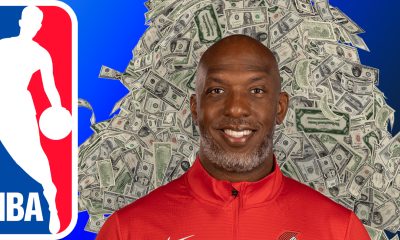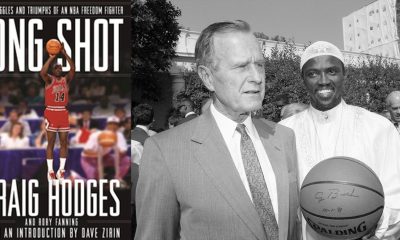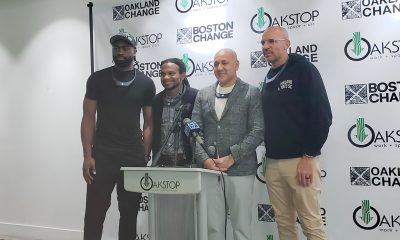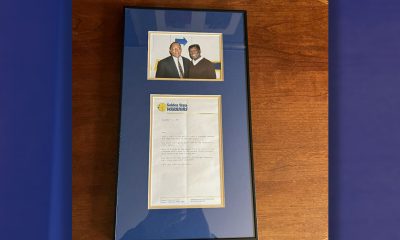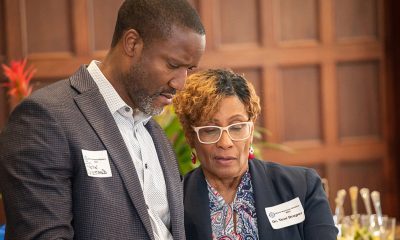Sports
Police: Pacers’ Copeland Stabbed Outside NYC Nightclub

Authorities say Indiana Pacers forward Chris Copeland, his wife and another woman were stabbed outside a Manhattan nightclub after an argument. (Alex Brandon/AP Photo)
COLLEEN LONG, Associated Press
VERENA DOBNIK, Associated Press
NEW YORK (AP) — Indiana Pacers forward Chris Copeland, his girlfriend and another woman were stabbed early Wednesday following an argument on the street near a Manhattan nightclub that also led to the arrest of two Atlanta Hawks players, authorities said.
The violence erupted just before 4 a.m. outside 1Oak Club, a trendy Chelsea spot where celebs such as Justin Bieber and Snoop Dogg mingle with partygoers, police said.
The couple was arguing on the street as the attacker eavesdropped and started to interfere, according to police. The dispute escalated until the 22-year-old suspect pulled out a knife and started slashing, police said. Copeland’s driver grabbed the suspect and held him until officers arrived.
The suspect, Shezoy Bleary, was in custody, authorities said. Police said charges were pending, and it wasn’t clear whether Bleary had an attorney who could comment on them.
Copeland, 31, a former member of the New York Knicks, was stabbed in the left elbow and abdomen and Katrine Saltara was slashed in the arm and across the breast. The second woman, who was believed to be with the attacker, was slashed in the abdomen. The victims were hospitalized and in stable condition, police said. Police recovered a switchblade at the scene.
Pacers coach Frank Vogel said Copeland had surgery on his elbow and abdomen and would be hospitalized overnight. He added it wasn’t known yet if Copeland would miss the remainder of the season.
Hawks players Pero Antic, 33, and Thabo Sefolosha, 30, who were not with Copeland but were also at the club, were arrested after police said they blocked officers from trying to start their investigation. The teammates were in town to play the Brooklyn Nets on Wednesday night. The team arrived late Tuesday, after beating the Phoenix Suns in Atlanta.
Antic and Sefolosha were released without bail after a brief court appearance where they were charged with obstructing governmental authority and disorderly conduct. Their attorney, Alex Spiro, said they did not commit any crime.
“They should not have been arrested. We fully expect the case to be dismissed,” he said.
The Hawks said neither Antic nor Sefolosha would play against the Nets. Sefolosha was limping during his court appearance and Spiro said he had been injured during the arrest. Coach Mike Budenholzer said the reserve would have his ankle checked.
The players issued a joint statement through the team, apologizing for any embarrassment they caused. The arrests were an unwanted distraction for a team that is less than two weeks away from starting the postseason.
“As members of the Atlanta Hawks, we hold ourselves to a high standard and take our roles as professionals very seriously,” the statement said. “We will contest these charges and look forward to communicating the facts of the situation at the appropriate time.”
Budenholzer called the incident “unfortunate,” but said the Hawks would support Antic and Sefolosha, who remained in New York.
“We’re very supportive of our players, and you never want to put yourself in a position where you can bring negativity to yourself or the organization or your teammates, but they’re great guys and I think right now it’s most important to support them,” he said.
The Pacers were in town to play the Knicks; Copeland played with New York during the 2012-13 season. Pacers President of Basketball Operations Larry Bird said the team was aware that Copeland had been injured.
“We are still gathering information and will update when we know more. Our thoughts are with Chris and those injured,” Bird said.
Copeland has played infrequently, missing 21 games since Jan. 31. With All-Star Paul George making his season debut Sunday, Copeland’s already limited minutes were expected to get cut. Police initially said Saltara was his wife, but Copeland’s agent said the two were not married. According to Saltara’s Facebook page, they have been engaged for several months.
In a statement, the club disputed the police account. It said the altercation stemmed from a dispute at a public housing project about two blocks away from the nightspot and that Copeland’s driver grabbed the suspect, who was later arrested.
“The incident occurred beyond the view of our security. Once alerted, the venue provided all assistance possible,” the statement read.
The club did not say how Copeland got back to the front of the club on West 17th Street, where the street was splattered with blood from the altercation.
The nightclub had been cited at least 10 times for altercations and four times for noise in 2014, according to data obtained by the New York Post from the State Liquor Authority.
___
Associated Press writers Jeff Martin in Atlanta and Rick Callahan in Indianapolis and AP Basketball Writer Brian Mahoney in New York contributed to this report.
Copyright 2015 The Associated Press. All rights reserved. This material may not be published, broadcast, rewritten or redistributed.
Alameda County
Seth Curry Makes Impressive Debut with the Golden State Warriors
Seth looked comfortable in his new uniform, seamlessly fitting into the Warriors’ offensive and defensive system. He finished the night with an impressive 14 points, becoming one of the team’s top scorers for the game. Seth’s points came in a variety of ways – floaters, spot-up three-pointers, mid-range jumpers, and a handful of aggressive drives that kept the Oklahoma City Thunder defense on its heels.

By Y’Anad Burrell
Tuesday night was anything but ordinary for fans in San Francisco as Seth Curry made his highly anticipated debut as a new member of the Golden State Warriors. Seth didn’t disappoint, delivering a performance that not only showcased his scoring ability but also demonstrated his added value to the team.
At 35, the 12-year NBA veteran on Monday signed a contract to play with the Warriors for the rest of the season.
Seth looked comfortable in his new uniform, seamlessly fitting into the Warriors’ offensive and defensive system. He finished the night with an impressive 14 points, becoming one of the team’s top scorers for the game. Seth’s points came in a variety of ways – floaters, spot-up three-pointers, mid-range jumpers, and a handful of aggressive drives that kept the Oklahoma City Thunder defense on its heels.
One of the most memorable moments of the evening came before Seth even scored his first points. As he checked into the game, the Chase Center erupted into applause, with fans rising to their feet to give the newest Warrior a standing ovation.
The crowd’s reaction was a testament not only to Seth’s reputation as a sharpshooter but also to the excitement he brings to the Warriors. It was clear that fans quickly embraced Seth as one of their own, eager to see what he could bring to the team’s championship aspirations.
Warriors’ superstar Steph Curry – Seth’s brother – did not play due to an injury. One could only imagine what it would be like if the Curry brothers were on the court together. Magic in the making.
Seth’s debut proved to be a turning point for the Warriors. Not only did he contribute on the scoreboard, but he also brought a sense of confidence and composure to the floor.
While their loss last night, OKC 124 – GSW 112, Seth’s impact was a game-changer and there’s more yet to come. Beyond statistics, it was clear that Seth’s presence elevated the team’s performance, giving the Warriors a new force as they look to make a deep playoff run.
Barbara Lee
WNBA’s Golden State Valkyries Kick Off Season with Community Programs in Oakland
“The Golden State Valkyries are more than a team—they’re a movement,” said Oakland Interim-Mayor Kevin Jenkins. “Their touchdown in Oakland marks a new era of opportunity, inspiration, and equity in sports. This partnership reflects our city’s deep commitment to uplifting women, investing in youth, and building a community where every dream has a place to grow. We’re proud to welcome the Valkyries to The Town.”
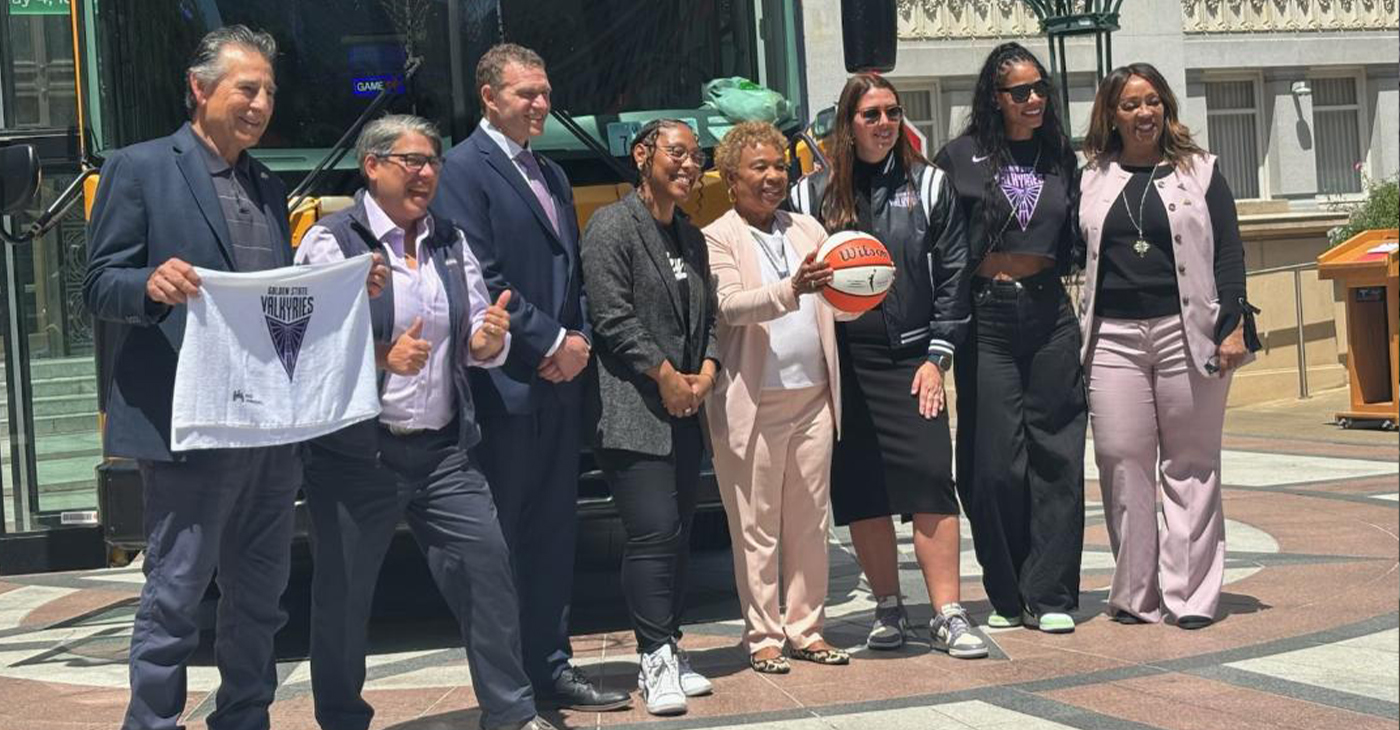
Team installs new nets at playgrounds, holds flag-raisings at City Halls in Oakland and S.F.
Special to The Post
The Golden State Valkyries brought the excitement of their inaugural season to every corner of the Bay Area with a full slate of community celebrations leading up to their historic home-opener against the Los Angeles Sparks at the Chase Center in San Francisco on Friday.
The week featured flag-raising ceremonies at city halls in Oakland and San Francisco, three “Violet Net” installation days at Oakland parks to encourage basketball play, fun “Hoopbus” takeovers at multiple schools presented by Kaiser Permanente, and player appearances.
“The Golden State Valkyries are more than a team—they’re a movement,” said Oakland Interim-Mayor Kevin Jenkins. “Their touchdown in Oakland marks a new era of opportunity, inspiration, and equity in sports. This partnership reflects our city’s deep commitment to uplifting women, investing in youth, and building a community where every dream has a place to grow. We’re proud to welcome the Valkyries to The Town.”
In total, 90 violet nets were installed on 45 basketball courts across 34 public parks throughout Oakland this week. A list of the parks receiving violet nets can be found at Valkyries.com.
About the Golden State Valkyries
The Golden State Valkyries, the WNBA affiliate of the seven-time NBA Champion Golden State Warriors, were announced as the 13th WNBA franchise on Oct. 5, 2023. According to Norse mythology, Valkyries are a host of warrior women who are fearless and unwavering – flying through air and sea alike.
This brand is Golden State’s modern interpretation of Valkyries: strong, bold, and fierce. Tipping off during the 2025 WNBA season, the team is headquartered in Oakland and will play home games at Chase Center in San Francisco. For Golden State Valkyries’ assets, including team logos, visit valkyries.com.
Activism
McClymonds High Names School Gym for Star Graduate, Basketball Legend Bill Russell
William “Bill” Felton Russell was born on Feb. 12, 1934, and died on July 31, 2022. He achieved fame as a U.S. professional basketball player who played center for the Boston Celtics of the National Basketball Association (NBA) from 1956 to 1969. He was the centerpiece of the Celtics dynasty that won 11 NBA championships during his 13-year career.
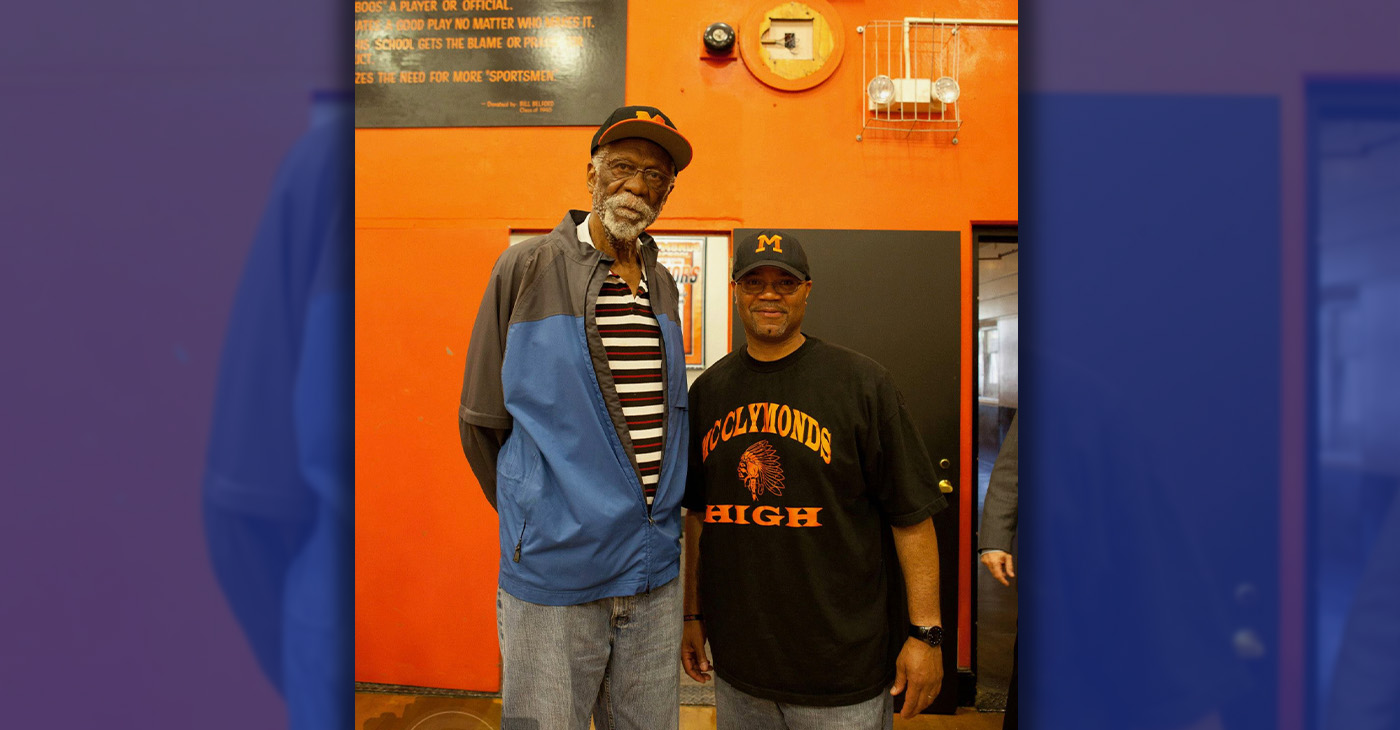
By Ken Epstein
West Oakland’s McClymonds High School, “the School of Champions,” this week named the school’s gymnasium in honor of one of its most famous graduates, basketball legend Bill Russell (class of ’52).
William “Bill” Felton Russell was born on Feb. 12, 1934, and died on July 31, 2022. He achieved fame as a U.S. professional basketball player who played center for the Boston Celtics of the National Basketball Association (NBA) from 1956 to 1969. He was the centerpiece of the Celtics dynasty that won 11 NBA championships during his 13-year career.
Russell is widely known as one of the greatest basketball players of all time. In 2011, he received the Presidential Medal of Freedom, the country’s highest civil honor, from President Barack Obama for Russell’s contributions to basketball and the Civil Rights Movement.
The McClymonds’ naming ceremony was held on Wednesday, the same day as Russell’s birthday. Oakland leader Bill Patterson, a longtime friend of Russell’s, was scheduled to cut the ribbon at the reopening of the gym, which had been closed for several months for renovation. Russell’s daughter Karen was scheduled to attend the ribbon cutting.
Russell’s name and signature are now printed on the gymnasium floor.
Patterson was working at DeFremery Park when he met Russell. “I befriended him as a boy and during his years at University of San Francisco” said Patterson. “We stayed friends for the rest of his life.”
Said McClymonds Principal Darielle Davis, herself a McClymonds graduate, “We are excited to honor Bill Russell for his sports accolades and because he broke color barriers. He is part of our legacy, and legacy is really important at McClymonds.”
Brian McGhee, community schools manager at McClymonds and former football player at UC Berkeley, said that Russell meant a lot to him and others at the school. “He was a beacon of light and hope for West Oakland,” he said. “He did a lot for sports and for civil rights.”
Starting in 2018, Ben “Coach” Tapscott worked with Patterson and other McClymonds grads, community members, and former coaches to encourage the Oakland Board of Education to endorse the naming of the school gym, which finally happened recently.
“We worked hard to make this happen,” said Tapscott. “He’s an important part of McClymond’s history, along with a lot of other famous graduates,” he said.
-

 Activism4 weeks ago
Activism4 weeks agoDesmond Gumbs — Visionary Founder, Mentor, and Builder of Opportunity
-

 Activism4 weeks ago
Activism4 weeks agoFamilies Across the U.S. Are Facing an ‘Affordability Crisis,’ Says United Way Bay Area
-

 Alameda County4 weeks ago
Alameda County4 weeks agoOakland Council Expands Citywide Security Cameras Despite Major Opposition
-

 Alameda County4 weeks ago
Alameda County4 weeks agoBling It On: Holiday Lights Brighten Dark Nights All Around the Bay
-

 Activism4 weeks ago
Activism4 weeks agoBlack Arts Movement Business District Named New Cultural District in California
-

 Activism4 weeks ago
Activism4 weeks agoLu Lu’s House is Not Just Toying Around with the Community
-

 Activism4 weeks ago
Activism4 weeks agoOakland Post: Week of December 17 – 23, 2025
-

 Black History2 weeks ago
Black History2 weeks agoAlfred Cralle: Inventor of the Ice Cream Scoop

